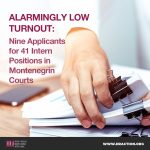10/10/2016 PUBLIC OPINION POLL ON GENERAL PERCEPTION OF MENTAL HEALTH ISSUES AND SOCIAL DISTANCE TOWARDS PEOPLE WITH MENTAL HEALTH ILLNESSES
10/10/201617/10/2016 MONTENEGRO AND THE INTERNATIONAL DAY FOR THE ERADICATION OF POVERTY
18/10/201617/10/2016 „VIBER“ AND „WHATSAPP“ SHUTDOWN DURING PARLIAMENTARY ELECTIONS IN MONTENEGRO IN BREACH OF FREE SPEECH
 The shutdown of applications “Viber” and “WhatsApp” on the day of parliamentary elections by telecommunication operators in Montenegro and the Agency for Electronic Communications and Postal Services, because a number of users of these applications received a message that the ruling political party was allegedly buying votes, was contrary to the freedom of expression and the Constitution of Montenegro, which says that only a competent court may prevent dissemination of information and ideas via public media according to narrowly defined reasons by the Constitution.
The shutdown of applications “Viber” and “WhatsApp” on the day of parliamentary elections by telecommunication operators in Montenegro and the Agency for Electronic Communications and Postal Services, because a number of users of these applications received a message that the ruling political party was allegedly buying votes, was contrary to the freedom of expression and the Constitution of Montenegro, which says that only a competent court may prevent dissemination of information and ideas via public media according to narrowly defined reasons by the Constitution.
HRA believes that shutdown of applications was not necessary in a democratic society and was not proportional to the objective – preventing unsolicited communication of political messages in order to protect the honor and reputation of one political party.
We believe that the fact that a number of users of these applications received (unwanted) political message, is not sufficient justification to resort to such drastic measures and suspended all users from all communications without their will and even without notice.
Nevertheless, the Article 145, paragraph 4 of the Law on Electronic Communications allows national regulator (the Agency for Electronic Communications and Postal Services) to order the operators to suspend internet and telephone communication without restriction, if it finds such action “justifiable in the cases of deceit or abuse.”HRA finds that this Article of the Law on Electronic Communications in principle allows for arbitrary and unlimited restriction of internet and telephone communications in Montenegro, and is therefore contrary to international human rights agreements and the Constitution of Montenegro. HRA will therefore submit an initiative to the Constitutional Court to declare it unconstitutional. In the meantime, we urge the Agency to take into account that over the Law on Electronic Communications there are the Constitution of Montenegro and international human rights agreements and to refrain from applying of this Article until the decision of the Constitutional Court.
The attitude of the Committee for Human Rights (CCPR, General Comment 34 on Article 19 of the International Covenant on Civil and Political Rights, para. 43) and the European Court of Human Rights (see the judgment in the case of Ahmet Yildirim v. Turkey, 2012 para. 64) is that restricting access to the internet, including work of the operators who provide such access, must be in accordance with international standards of freedom of expression, proportionate to the legitimate aim and necessary in a democratic society. This means that restrictions must be precisely regulated, must provide judicial review to prevent abuses and “should not, for example, enable you to ban publication of material just because it criticizes the government” (CCPR, see above).
The Montenegrin media reported that the operator Mtel announced that “by order of the Agency, operators were required to implement a measure of a temporary ban on the use of those applications, because they are used for unwanted communication, and in accordance with the provisions of the Law on Electronic Communications. The Act provides that the communication for direct marketing purposes is allowed only with the prior consent of users.” The director of the Agency for Electronic Communications and Postal Services said in a statement for the portal Antena M that the order for shutdown of Viber and WhatsApp’s was brought because operators cannot control messages with propagandistic content, which in unlimited quantities arrive via these services and in a statement to daily Pobjeda today confirmed that the Agency applied the Article 145 HRA assesses as unconstitutional.







 English
English